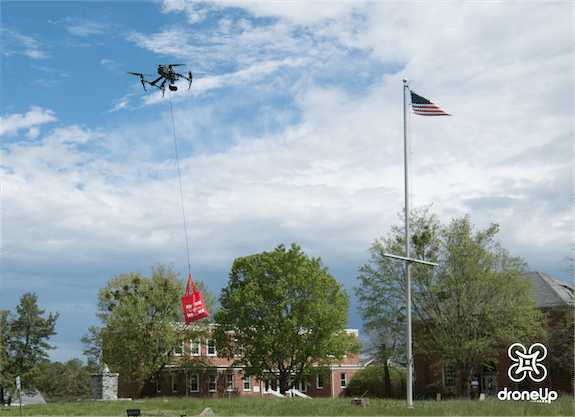DroneUp, partners test how UAS could help medical professionals battling COVID-19
April 21, 2020 | AUVSI News

To determine how UAS could help medical professionals in their fight to stop the spread of the Coronavirus, DroneUp, UPS and its subsidiary UPS Flight Forward (UPSFF), Virginia’s Center for Innovative Technology (CIT), and Workhorse Group recently came together to test the technology in Lawrenceville, Virginia.
The entities say that experts in the healthcare industry and in government are looking for technology that could speed the pace of testing and treatment for infected patients, making autonomous drones a potentially valuable tool. The tests evaluated the commercial drone industry’s ability to provide and scale small UAS to support a variety of use cases to speed and assist the U.S. healthcare system during the pandemic.
“I am encouraged to see so many private sector partners stepping up and thinking innovatively as we work together to combat COVID-19,” says Virginia Governor Ralph Northam.
“Drones can be an important way to deliver medical supplies while people stay home to adhere to our social distancing guidelines. Virginia is well-positioned to be a leader in the unmanned system industry, and we are pleased to be part of this initiative.”
Over the course of three days earlier this month, the test participants conducted exercises on the vacant campus of St. Paul’s College in Lawrenceville, Virginia.
With a focus on delivery to residential and commercial areas, the exercises sought to determine several things including: “safe operational capacities based on existing technologies, policies, personnel and environmental restrictions; airspace de-confliction and operator safety policies necessary for peak optimal capacity; processes, policies and training necessary to conduct efficient, safe and effective delivery operations during day and night; and proposed policy changes that would further enable the use of these autonomous airborne advanced technologies.”
“Many in the public – along with federal, state and local officials – are asking how drones can be used in this time of crisis,” says Tom Walker, DroneUp CEO.
“Rather than speculate, it is incumbent upon our industry to conduct operationally-based exercises that produce factual data and lessons learned to ensure we can respond safely, effectively and efficiently when called upon. Data collected now will impact our capabilities beyond the COVID-19 outbreak we are currently facing.”
Data collected during the simulation will be used to determine the most effective ways that private-sector drone operators can supplement emergency response and certain patient care. The findings and recommendations will be included in a report to the White House, where leaders are considering what role this technology and others like it could play in the Coronavirus response.
Photo below: DroneUp recently partnered with UPS and subsidiary UPS Flight Forward (UPSFF) with Virginia’s Center for Innovative Technology (CIT), and Workhorse Group in tests designed to determine how UAS can assist medical professionals in their fight to stop the spread of the Coronavirus. Photo: DroneUp
- Industry News


